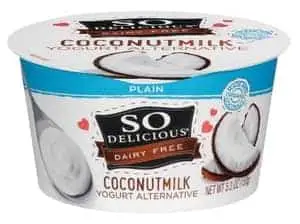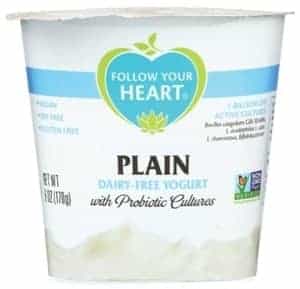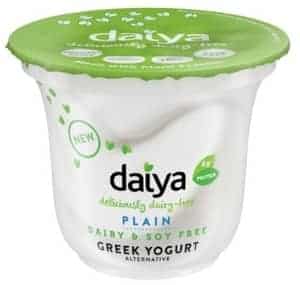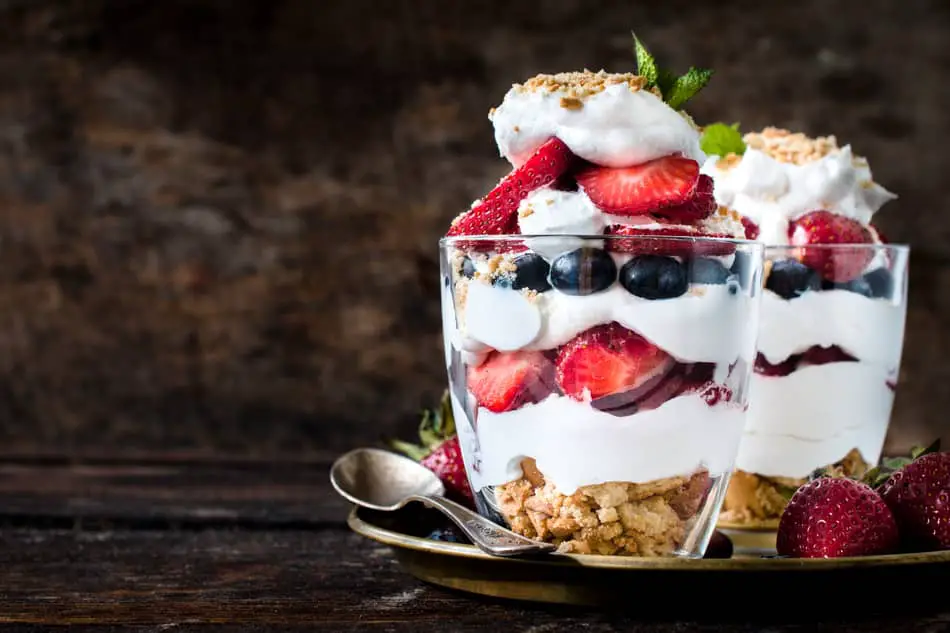I get asked quite often whether yogurt is suitable for vegans, usually from those who are new to the subject of vegan and plant-based diets (i.e. readers who aren’t yet quite sure what the vegan diet includes/omits) and folks who may know all about the vegan diet, but aren’t sure what yogurt actually is.
Is it vegan? No, authentic yogurt is never vegan. That goes for regular, Greek, plain, and flavored yogurt products. Yogurt is a dairy product, which means it’s animal-derived and thus non-vegan. One day there will likely be lab-cultivated dairy, but as for now, all milk products are derived from animals.
“Yogurt” which comes from the Turkish word “Yoghurmak,” meaning, “to thicken”, is a popular fermented food product that’s been around for quite some time.1 In fact, it’s made by a souring process that dates back to prehistory.2
Because it’s such an iconic food and has been around for so long, a lot of folks want to know if they have to give up the food product after becoming vegan.
To address the various reasons folks often wonder if yogurt is vegan, we’ll go over the reasoning behind why the food product is considered unsuitable for vegan consumption.
Why Yogurt Isn’t Vegan
Yogurt Is Derived from Milk
Several food products contain milk in one form or another. While milk is itself a beverage, there are all sorts of food products that use milk as a base, including yogurt and yogurt drinks, as well as kefir, milkshakes, smoothies, eggnog, etc.
Yogurt is one of the food products that’s primarily made from milk. Others include cheese, sour cream, and whipped cream.3
Again, “yogurt” comes from the Turkish name “Yoghurmak,” which means, “to thicken.”1 The name reflects the thickening process by which milk is converted into yogurt. Specifically, yogurt is a fermented food product created by adding bacterial cultures to milk.
Yogurt is made by mixing two types of bacteria, Streptococcus thermophilus and Lactobacillus bulgaricus, and then adding them to homogenized, pasteurized milk at which point some MSNF (milk solids non-fat) are usually added.
These bacteria ferment the lactose content of the milk (lactose being the simple sugar present in milk) to lactic acid, a very old process that’s been used in fermented dairy foods since prehistory.2
Cultured or fermented milk products have been used for centuries, and it’s long been thought that they offer several health benefits.4
These bacteria influence the texture, acidity, and shelf life of the dairy products they are added to. Some bacteria are naturally present in dairy, so they’re considered natural components of the food product. However, nowadays, these same bacteria tend to be added during manufacturing.
The end result is the same, which is a fermented, smooth, semi-solid dairy product made from milk of varying fat content including whole, reduced-fat, and fat-free milk.
The product tends to be on the thicker side (requiring a spoon), though yogurt drinks are also gaining in popularity in recent years.5
I’m mentioning the various forms yogurt can take, because I often get asked about the vegan status of different types of yogurt, including plain, Greek, flavored, etc. So, keep in mind that real yogurt, in any form, is considered non-vegan.
Milk Products Are Animal-Derived and Thus Non-Vegan
There’s been a bit of confusion around what the vegan diet actually entails. A lot of people, understandably assume it’s strictly a health diet, and that those who follow vegan diets are primarily concerned with avoiding processed foods.
In fact, some marketing campaigns have restricted the vegan label to products that are non-animal-derived as well as non-GMO, organic, etc. Such erroneous distinctions have been the source of much confusion.
While human health is definitely an area of concern in the vegan community, the vegan diet at its core, is defined as an eating pattern that excludes all animal products.
While some who identify as “vegan for health reasons” have concerns about GMO products and the use of pesticides, etc., the vegan diet does not restrict highly processed “junk” foods or foods that are non-organic, GMO, etc. if they are not animal-derived.
Further adding to the confusion, is that some self-proclaimed vegans are okay with eating yard eggs—eggs laid by hens that are raised humanely on one’s own property.
For this reason, it’s understandable that folks who are unfamiliar with 100% plant-base diets may assume that a vegan would give the green light to consuming milk products like yogurt, so long as the milk was sourced from cows that are humanely treated.
But make no mistake about it: consuming eggs and dairy in any form is a non-vegan practice and anyone who does so would be considered a lacto-ovo vegetarian—not a vegan.
If the above is confusing, you should check out the article I wrote on the various types of plant-based diets.
If you’re in a rush, there’s a big chart that distinguishes the eating patterns per what they include/omit.
The bottom line is that yogurt is derived from milk, and milk is obtained from mammals, thus real yogurt is always off-limits for vegans, regardless of whether the yogurt was obtained from humanely treated cows.
Vegans exclude yogurt and other milk products from their diet for a variety of reasons, including:
- Health concerns. Milk has several components (milk proteins, saturated fat, and cholesterol) that are largely thought to be unhealthy.
- Ethical concerns. Reasons related to the treatment of non-human animals.
- Environmental concerns. Animal agriculture has a number of negative impacts on the environment. For one, cattle emit large quantities of methane, which is a greenhouse gas that’s known to contribute directly to climate change.
If you’re primarily concerned with health, keep in mind that milk is a significant source of cholesterol and saturated fat in the human diet. The protein content of milk is associated with higher levels of insulin and IGF-1, which is implicated in the pathology of many cancers.6
Dairy is a significant source of exogenous hormones, the exposure to which is linked to several cancers including prostate and breast cancer.7
Commercial Vegan “Yogurt” Products
Yogurt alternatives didn’t originate with specialty vegan products. For example, soy yogurt has been used at least as far back as 1907.8
Remember, fermented milk products have long been thought to confer certain health benefits. Dairy allergies are fairly common, so manufacturers sought alternatives to regular yogurt and soy is a commonly fermented food.
Also, a lot of people are lactose intolerant, so non-dairy yogurt is often preferred by folks like yogurt, but experience excessive bloating and flatulence from consuming milk products.
The milk used to make yogurt is typically higher in lactose (not by much) compared to regular milk—due to the addition of MSNF—though, the fermentation process decreases the lactose content to about 4%.9
Anyway, for the above reasons, it should be fairly easy to find non-dairy yogurt. Even supermarkets like Walmart tend to carry them.
We’ll go over a few here to give you an idea of what’s out there.
So Delicious Yogurt

Ingredients for the 24 oz include:10
- Organic Coconutmilk (Filtered Water, Organic Coconut Cream)
- Organic Cane Sugar
- Rice Starch
- Calcium Citrate
- Pectin
- Live And Active Cultures
- Vitamin D2
- Vitamin B12
This is the plain version, but they’re all vegan.
Follow Your Heart Dairy-Free Yogurt

Ingredients include:11
- Organic Coconut Milk* (Filtered Water, Organic Coconut Cream*)
- Inulin (from Chicory Root and Agave)
- Natural Flavors
- Powdered Cellulose
- Glucono Delta Lactone
- Pectin
- Tricalcium Phosphate
- Magnesium Citrate
- Lactic Acid
- Sea Salt
- Calcium Lactate
- Live Cultures (Bacillus coagulans GBI-30 6086, L. acidophilus, L. casei, L. rhamnosus, Bifidobacterium).
Vegan Greek Yogurt
Again, regular Greek yogurt is non-vegan. Greek yogurt aka strained yogurt, sack yoghurt, or yogurt cheese is a type of yogurt that’s been strained to remove most of its whey content, leaving behind mostly casein protein. Whey protein is a protein that’s abundant in milk, second only to casein.
Casein is a thicker protein which denatures/coagulates when exposed to acid (whey denatures with heat), which is why it keeps you full for so much longer compared to plain yogurt.
When the protein content coagulates due to stomach acid, the enzymes in your GIT can’t get to it as quickly, so it takes longer to digest thus contributing to its satiating effect.
So, vegan versions of Greek yogurt are far from the real thing. And, from what I can tell, they don’t seem to have a much higher protein content than regular non-dairy yogurt.
But, they do achieve that thick creamy texture characteristic of Greek yogurt (with the help of guar gum and other plant-based substances), so if you prefer Greek to regular yogurt for the texture and mouthfeel, this may be the yogurt for you.
Daiya Classic Greek Yogurt Alternative

Again, there are several flavors available.
The basic ingredients include:12
- Filtered Water
- Coconut Cream
- Pea Protein Isolate
- Creamed Coconut
- Potato Protein
- Chicory Root Extract
- Cane Sugar
- Vegan Natural Flavors
- Potato Starch
- Lactic Acid (Vegan)
- Rice Starch
- Tricalcium Phosphate
- Tamarind Seed Gum
- Locust Bean Gum
- Lemon Juice Concentrate
- Guar Gum
- Sea Salt
- Vitamin D
- Yeast
- Cultures – L. plantarum, L. casei
- Vitamin B12
That’s it for the vegan status of yogurt. Thanks for reading.
You may also want to check out the following related articles:
- Is Sour Cream Vegan?
- Is Ranch Vegan?
- Is White Chocolate Vegan? (How to Know for Sure)
- Is Soy Vegan? (Soy, Tofu, Soy Milk, Miso, Etc.)
References
- Pszczola DE, and K Banasiak. Ingredients. Food Technology 60(5):45–92, 2006.
- Stevens HC, and L O’Brien Nabors. Microbial food cultures: A regulatory update. Food Technology 63(3):36–41, 2009.
- Understanding Food: Principles and Preparation (Page 211). Amy Brown – Wadsworth Cengage Learning – 2011
- Fiander A, et al. Effects of lactic acid bacteria and fermented milks on eicosanoid production by intestinal epithelial cells. Journal of Food Science 70(2):M81–M86, 2005.
- Oklahoma Cooperative Extension. Fact Sheets. A Profile of Food.
- Giovannucci, E. Insulin-like growth factor-I and binding protein-3 and risk of cancer. Horm Res., 51 Suppl 3:34-41, 1999. https://www.ncbi.nlm.nih.gov/pubmed/10592442
- Liehr, J.G. Is estradiol a genotoxic mutagenic carcinogen? Endocr. Rev., 21(1):40- 54, Feb 2000. https://www.ncbi.nlm.nih.gov/pubmed/10696569
- Soyinfo Center. http://www.soyinfocenter.com/books/156
- Savaiano DA, and MD Levitt. Nutritional and therapeutic aspects of fermented dairy products. Contemporary Nutrition 9(6):1–2, 1984.
- Plain Coconutmilk Yogurt. https://sodeliciousdairyfree.com/dairy-free-foods/dairy-free-yogurt-alternatives/coconutmilk-yogurt/plain
- Dairy-free Yogurt Plain. https://followyourheart.com/products/dairy-free-yogurt-plain/
- Classic Plain Greek Yogurt Alternative – Daiya Foods, Deliciously Dairy-free Cheeses, Meals & More. https://daiyafoods.com/our-foods/classic-greek-yogurt-alternative/plain/

